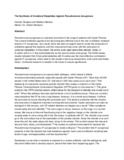| dc.description.abstract | Pseudomonas aeruginosa is a bacteria prominent in the lungs of patients with Cystic Fibrosis. The current antibiotics against it are becoming less effective due to the rise in antibiotic resistant strains of P. aeruginosa . As a result, there has been an urgent need to revise the production of antibiotics against this bacteria, and this improvement has come with the production of unnatural dipeptides. In this project, the amino acids used were either alanine, valine, or D-valine with 2 or 3 -fluorophenylalanine as the second amino acid group. The biofilm assay results indicated that 3-fluorophenylalanine with D-valine was the most effective combination against P. aeruginosa, which adds to the results of previous researchers, Andi Lamb and Kellee Geren. Continued research is needed in the future to ensure significance. | en_US |

